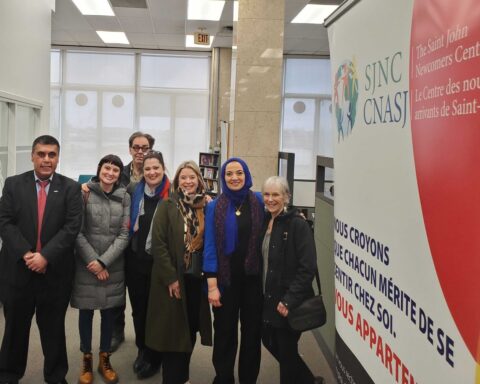Immigration, Refugees and Citizenship Canada (IRCC ) is out of touch with the needs of local communities when it comes to funding programs to help newcomers, states a new report by the Association for Canadian Studies (ACS).
“They sit and make decisions from the ivory tower in Ottawa,” said the report in a summary of views from four focus groups comprising newcomer settlement service workers.
The focus group narrative report — Envisioning the Future of the Immigrant Serving Sector — centered around finding solutions to key challenges faced by new immigrants and service providers, which have been exacerbated by the onset of COVID-19.
The most highly discussed topic centred around restrictive and short-term IRCC funding agreements resulting in less innovation and sustainability in the sector.
Participants cited a lack of sustainability within the sector due to strict funding agreements and to the precarious nature of not knowing whether or not a program will continue to receive funding.
While the IRCC has switched to five-year funding agreements, the agreements still need to be negotiated each year, the forum heard.
“The IRCC has ultimate control over deciding which projects receive funding, and many participants felt as though sometimes the IRCC is out of touch with the needs of local communities.”
Funding voids
For instance, The Regional Municipality of York reported that the last funding cycle cut back significantly on employment services due to many newcomers entering Canada through express entry. Immigrants of this class are often expected to be workforce ready.
But many still struggle to find adequate employment due to barriers such as lack of credential recognition, the re-licensure process, underemployment, as well as lack of childcare and/or transportation.
“Putting an onus on us to constantly fight for funding from various sources, from various models, really takes away from the work that we actually do,” said one of the participants, all of whom remained unnamed in the report.
Other examples brought forward by the focus groups include a youth program funded by the IRCC which was not able to provide any field trips for the youths due to the funding for the program not covering any transportation costs.
The South Okanagan Immigrant and Community Services (SOICS) reported that honoraria to support newcomers contributing their time are not covered by the IRCC funding it gets.
Other costs involving building closer relationships with the Indigenous communities through contact and hospitality, are also not covered by IRCC funding.
“There is a bit of a disconnect between the policy side and the operational side of our system when it comes to funding settlement services,” said a focus group participant.
Inconsistent models
Inconsistencies in funding models was another key issue.
A participant noted that there is a lack of job security and consistency for settlement workers due to funding agreements and program-based funding not covering pensions, long-term employment, or steady salaries.
Several respondents also critiqued the fact that IRCC funding models focus on outputs rather than impact and outcomes and meeting targets, rather than modernizing, innovating, and measuring long-term successes.
‘Counting the numbers’ is particularly unhelpful for rural settlement agencies who do not have large numbers, in which case the quality of settlement support should be the primary focus, said the report.
Similarly, one participant of a large, rural agency felt as though they were penalized for not having enough clients, especially during the pandemic, when fewer clients were able to travel to in-person sessions or find child care.
Proposed solutions
While discussing solutions for improving funding models, forum participants gave importance to engaging private organizations like banks, universities and social development initiatives.
One example cited involved Immigrant Services Calgary, which has been successful in securing a loan through a program called UCeed Social Impact Fund that was organized through the University of Calgary and Innovate Calgary.
Another solution raised was to scale up small, innovative, successful projects to larger organizations after they have been proven effective, rather than creating large-scale programs that cannot be down-scaled for smaller rural communities.
Multiple participants also discussed the need for increased staffing, as well as retention of service providers who leave to pursue more financially rewarding employment.
“Staff retention is a huge piece for us and that kind of goes more with the wages of the settlement sector,” one participant said.
“You basically become the training ground for government positions or city positions, where I lost, recently, three staff in three weeks to Island Health and our city of Nanaimo, where their casual staff is earning $30 an hour. How can you compete, as a non-profit sector, with that?”
The report, segmented into four sections — building capacity, best practices, funding models and improving attraction/accessibility of settlement services — provides a base to expand on the solutions uncovered, according to the Association for Canadian Studies, which conducted the research funded by the WES Mariam Assefa Fund.
“We ultimately intend to pilot projects to address the issues and test solutions and recommendations to improve settlement and economic outcomes,” the study concluded.
Editor’s Note: A previous version of this article incorrectly said the study was conducted in collaboration with the WES Mariam Assefa Fund. This version has been updated to reflect that the study is, in fact, funded by the WES Mariam Assefa Fund.
A multiple-award winning journalist, Fabian Dawson is an internationally acclaimed author, filmmaker and media expert. His work over the last four decades spans the globe and he also serves as a consultant/strategic advisor to a variety of international companies. As deputy editor-in-chief of The Province, part of the Postmedia chain, Dawson led initiatives within a special publications group to provide directed content for a variety of organisations. He was named the 2019 recipient of the Bruce Hutchison Lifetime Achievement Award at Jack Webster Awards. Dawson has been invited by the governments of India, Malaysia, Taiwan, China, Hong Kong and the United States to act as a media observer/advisor on a variety of Asian-Canada issues. Dawson, now operates FD Media, which specializes in harnessing editorial assets to revenue generating opportunities.






What I would like to know is who audits these settlement services to make sure they working as they should?
When I arrived in Toronto Airport Canada I was directed by Canadian Border Services Agency (CBSA) to the Service Ontario office used to “welcome” new immigrants. They insisted I make an appointment with one of Toronto’s many “volunteer” settlement services to help to get settled. I put volunteer in quotes because when I attended I found these “volunteers” were employed by realtors, education establishments, and career advisers to sell their services to new immigrants. There were a few employers – but none offered skilled work. They were all for warehouse, supermarket, and serving fast-food.
The first meeting they arranged for me was with a “volunteer” career advisor whose first words to me were:-
“you may have been somebody in your home country with your education and experience but that counts for nothing now. Drop your ego & start from the bottom. If you don’t like it leave.” I left
When I began looking for work without help of these settlement agencies I set up interviews with employers advertising for Senior/Director level IT positions – the skill that qualified me to immigrate. When I arrived at these interviews I discovered they were not for the position I applied but were in fact career fairs organized by settlement organizations and only offering fast-food or warehouse work, trying to sell education courses or realtor services. All they wanted was my SIN number so they could claim funding from either Ontario or Ottawa – nobody seemed interested in helping me get employment for the career that qualified my immigration. Nobody seemed to think it was wrong to get there under false pretences.